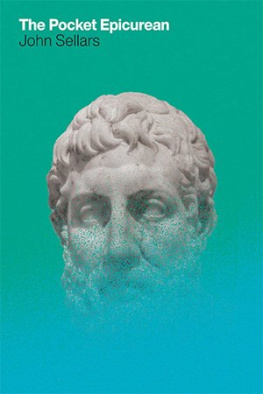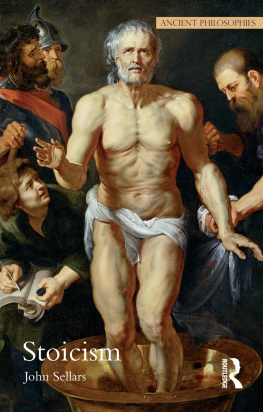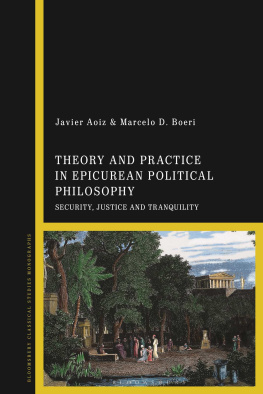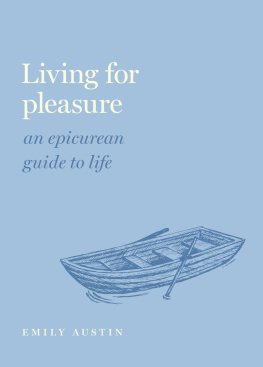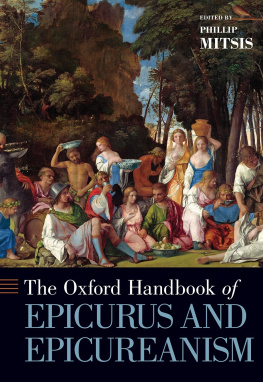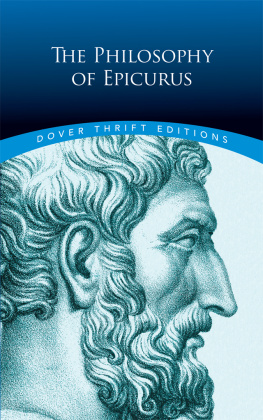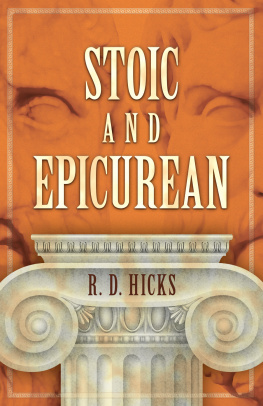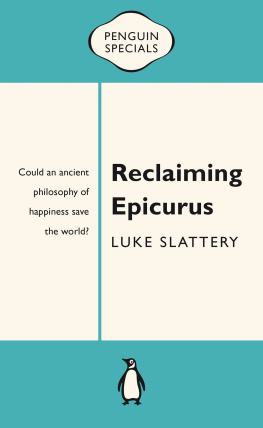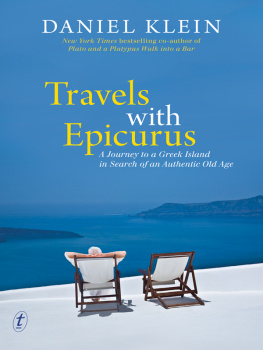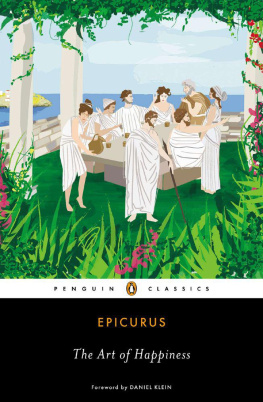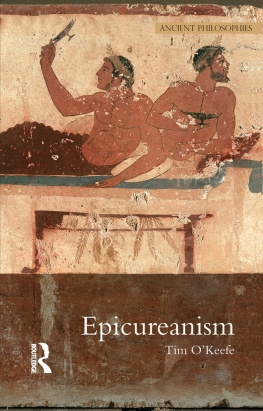
The Pocket Epicurean
The Pocket Epicurean John Sellars
t h e u n i v e r s i t y o f c h i c a g o p r e s s
The University of Chicago Press, Chicago 60637
2021 by John Sellars
The author has asserted his moral rights.
All rights reserved. No part of this book may be used or reproduced in any manner whatsoever without written permission, except in the case of brief quotations in critical articles and reviews. For more information, contact the University of Chicago Press, 1427 E. 60th St., Chicago, IL 60637.
Published 2021
Printed in the United States of America 30 29 28 27 26 25 24 23 22 21 1 2 3 4 5
ISBN- 13: 978- 0- 226- 79864- 6 (cloth) ISBN- 13: 978- 0- 226- 79878- 3 (e- book) DOI: https://doi.org/10.7208/chicago/9780226798783.001.0001
Originally published as The Fourfold Remedy: Epicurus and the Art of Happiness by Allen Lane, an imprint of Penguin Random House UK, 2021.
Library of Congress Cataloging- in- Publication Data Names: Sellars, John, 1971 author.
Title: The pocket Epicurean / John Sellars.
Other titles: Fourfold remedy
Description: Chicago : The University of Chicago Press, 2021. |
Includes bibliographical references.
Identifiers: LCCN 2021004320 | ISBN 9780226798646 (cloth) |
ISBN 9780226798783 (ebook)
Subjects: LCSH: Epicureans (Greek philosophy) Classification: LCC B512 .S45 2021 | DDC 187 dc23
LC record available at https://lccn.loc.gov/2021004320
This paper meets the requirements of ANSI/NISO Z39.48- 1992
(Permanence of Paper).
Contents
Prologue 1
1. Philosophy as Therapy 7
2. The Path to Tranquillity 23
3. What Do You Need? 39
4. The Pleasures of Friendship 53
5. Why Study Nature? 67
6. Dont Fear Death 85
7. Explaining Everything 99
Epilogue 113
Further Reading 117
References 121
Prologue
W H AT D O W E really need in order to live a happy life? Many of us spend an inordi-nate amount of time and effort trying to secure the things that we think we need in order to live well. But how many of us have paused to think about what it is that we actually need in order to feel satisfied? Over two thousand years ago the Greek philosopher Epicurus did just that. He thought about what it is that we really desire and what we do and do not need in order to meet that desire. His answer was seemingly simple: 1
Prologue | 2
pleasure. All that we really want is pleasure.
Today we tend to associate the word epicurean with the enjoyment of fine food and wine, the gluttonous satisfaction of physical appetites, and decadent self- indulgence.
But these things are a world away from the vision of a pleasant life developed by the original Epicureans. Epicurus was more concerned with mental pleasures than physical ones, and in some respects more concerned with avoiding pain than pursuing pleasure directly. His vision of the ideal human life focused not on satisfying ones physical appetites but rather on reaching a state free of all mental suffering. He called this ataraxia, literally untroubledness, but perhaps best translated as tranquillity. That, he suggested, is what we are all really after, and he claimed to know how best to achieve it.
How might we overcome mental suffering and reach this state of tranquillity? Epicurus thought that first we need to identify the causes of our anxieties and then we need
Prologue | 3
arguments to show us that those anxieties are groundless. We have no good reasons to worry about the things we do. Epicurus iden-tified four sources of distress and proposed arguments designed to counter them. This led one of his later followers to call Epicurean philosophy the fourfold remedy.
Over the centuries, Epicureanism has not always fared well. It has been associated with atheism, immorality, and gluttony of the senses. As a consequence it was for a long time demonized as a dangerous, corrupting doctrine. Nothing could be further from the truth. Epicurus advocated a modest life based on simple pleasures, all for the sake of attaining mental tranquillity here and now.
The Epicurean message is that you already have everything you need, if only you could see it. Once you grasp that, all other anxieties will just melt away.
This book is, depending on your point of view, either a companion or a competitor to my Pocket Stoic. Epicurus was a contem
Prologue | 4
porary of the founder of Stoicism, Zeno, and in antiquity the two schools were often presented as rival philosophies. Indeed, Epicureans and Stoics often argued against one another. While the Stoics advocated the cultivation of a virtuous character and saw Nature as rationally ordered, the Epicureans championed pleasure and thought the natural world was the chance product of chaos.
Yet they also shared a lot of common ground.
Both schools thought that all of our knowledge comes via our senses, that everything that exists is material, and that we die with our bodies. Both argued that a good life does not require a great deal of material possessions and both claimed that what matters most is attaining a tranquil state of mind.
In antiquity the Stoic Seneca often quoted from both Epicurus and the Roman Epicurean poet Lucretius when he thought they had said something of universal value. In the early nineteenth century, Johann Wolfgang von Goethe commented that some people
Prologue | 5
are temperamentally half Epicurean and half Stoic, upsetting the traditional view that these two schools of thought are fundamentally incompatible. More recently, Albert Ellis founder of Rational Emotive Behaviour Therapy listed Epicurus alongside the Stoics Epictetus and Marcus Aurelius as one of the ancient precursors of modern cognitive psychotherapy.
Epicureanism has much to teach us today.
In an age rife with anxiety, it offers a path to peace of mind. In a culture of excessive material consumption, it prompts us to rethink how much we really need in order to live well. In an era of increasing social isola-tion, it reminds us of the value of friendship.
Perhaps most importantly of all, when we are often surrounded by misinformation, it insists on the importance of unvarnished truth.
Philosophy as
Therapy
E M P T Y A R E T H E words of the philosopher who offers therapy for no human suffering.
So said the philosopher Epicurus, who was born and brought up on the Greek island of Samos towards the middle of the fourth century bc. He first became interested in philosophy as a teenager when, so the story goes, he was disappointed by his schoolteach-ers inability to explain the central themes in Hesiods poetry. His parents were originally from Athens and so Epicurus inherited their citizenship. When he turned eigh-9
Chapter One | 10
teen, Epicurus travelled to his familys native city, perhaps to complete the military service required of Athenian citizens. Around the time that he was due to return home, his family, along with other Athenian settlers, were expelled from Samos, and Epicurus found himself wandering from place to place for a few years. For a while he lived in Mytilene, on the island of Lesbos, where he started to teach philosophy and met his life-long friend Hermarchus. The locals did not take kindly to his Athenian manner of pub-lic philosophizing, so Epicurus, Hermarchus, and perhaps a few others moved on to Lampsacus on the mainland of Asia Minor, in the general vicinity of ancient Troy. There, over a number of years, Epicurus built up a school of loyal followers, although this time they kept themselves to themselves, having learned from the experience in Mytilene.
Next page
